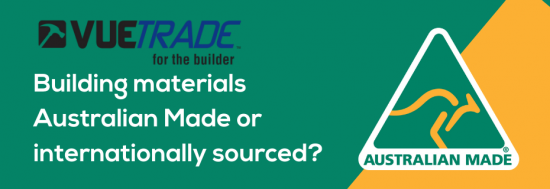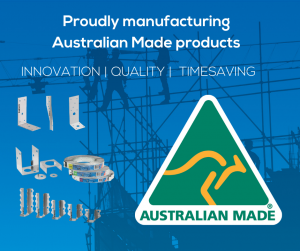Building materials – Australian-made or internationally sourced?
It’s an age-old question faced by many industries and the construction industry is no exception — whether to purchase materials locally or from overseas. Often the answer to this question is price-based but that shouldn’t be the only consideration.

What else other than price should I inquire about?
While some products sourced overseas are manufactured in bulk quantities, in which case they can be purchased at a lower production cost per unit than the equivalent product manufactured back home, here are some other things to think about.
- Product availability — If you need a regular supply of materials, check whether they will be inconsistent supply from the supplier in question over the medium to long term. One of the many lessons we’ve learned through world events over the last two years is that there can be a down-side to our heavy reliance on imports.
- Freight costs — While at first glance the cost per unit of an international product may be attractive, take into account any freight cost differential associated with purchasing product from further afield. It’s possible that any price savings compared with an Australian-made product are effectively negated by freight costs.

- Shipping reliability — Depending on what you’re purchasing and how it’s shipped, shipping times may be lengthier when purchasing international product rather than Australian-made. Add to that the greater risk of loss or damage during transit and cost of insuring against that risk, suddenly a decision based on price alone doesn’t look quite so straight-forward.
- Supporting the Australian economy — It’s also worthwhile taking a step back and looking at the bigger picture. Purchasing products made in Australia keeps the money flow Down Under and supports Aussie jobs. So, if the price between an international or local product is comparable after taking all factors into account, why wouldn’t you go Aussie-made?
- Quality — That old adage of, “You get what you pay for,” often rings true. One benefit of purchasing Australian-made materials is that can be easier to ask the supplier about manufacturing processes and quality control measures in place. You’re also not taking a punt on whether an international manufacturer is across Australian Standards for products and performance. Australian manufacturers are conscious of the temptation for clients to purchase products elsewhere and are eager to keep clients happy through quality products and good customer service. They also have an obligation to comply with any Australian Standards relevant to their product and tailor their manufacturing processes accordingly.
- Recourse when things go wrong — This is where purchasing from an Australian supplier comes into its own. It’s much easier to resolve those rare issues that do arise from time to time with someone local and organise returns and reshipping than it is with an international supplier.
Australian Owned, Australian Made, Product of Australia — what’s the difference?
All these similar terms can be confusing, so it helps to understand the particular meaning of each if you’ve decided to keep your supply chain local.
- Australian Owned — This label refers to the location of the manufacturing company’s ownership. It does not mean the product has been made in Australia, nor that any of its ingredients have been sourced here.
- Australian Made — A product may be certified as Australian Made without all of its ingredients being sourced in Australia. Under the Australian Consumer Law, to claim a product has been ‘made in Australia’, the product must have undergone its last substantial transformation in Australia. This occurs if the product was grown or produced in Australia, or if the end product is fundamentally different from all of its imported ingredients or components as a result of one or more processes carried out in Australia.
At first glance, you might ask, “If the product’s components are sourced overseas, am I any better off purchasing an Australian Made certified product when it comes to quality than purchasing the finished product from overseas?” The short answer is, “Yes”. Given the product has to be substantially transformed in Australia to receive this certification, this essentially introduces a quasi quality check between the manufacture of the product’s components and your purchase of the final Australian Made product. That is, the “middle man” that substantially transforms those components into the end product is likely to pick up any quality issues with components before the end product finds its way into your hands.
In the building industry, it is common to have products coming from overseas, and some of the block roads we have recently encountered are freight costs and shipping liability have driven the prices up and made them unavailable to builders.
Here at VUETRADE, we’re pretty chuffed that around 70% of our products are certified as Australian Made. We are proud to support Aussie Jobs and supporting the building industry with some of the most popular materials.
Our Joist Hangers, Builders Strapping and Post Supports Bolt Downs are some examples of the range we have available, with the Australian Made certification, feel free to check our website for more information.
It’s a good idea from time to time in both our personal and business lives to stop, compare options in the market and consider the alternatives out there. When was the last time you stopped to think about the quality of the materials you’re using and which economy you’re supporting with your current supplier’s? It’s food for thought.


